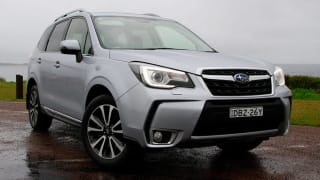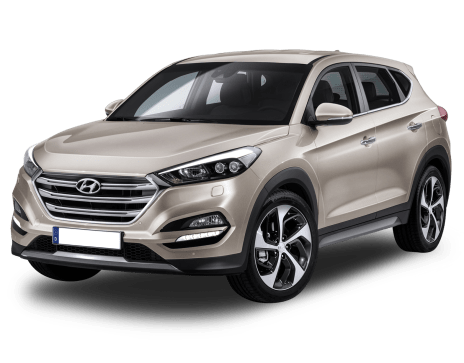
Subaru Forester XT Premium 2017 review
Peter Anderson road tests and reviews the Subaru Forester XT Premium with specs, fuel consumption and verdict.
Browse over 9,000 car reviews
Peter Anderson road tests and reviews the Hyundai Tucson Highlander CRDi diesel auto with specs, fuel consumption and verdict.
The Tucson range is a big one, and right at the top, nudging $50,000, is the diesel Highlander. Packed with gear, including a range of safety features you can't get lower down the ladder, the Highlander probably isn't at the top of your list when eyeing up Hyundai's newest SUV.
We spent a week at the wheel to find out if the extra spend required over the Elite - or even the Active X - is worth considering.

The Highlander sits at the very top of the huge Tucson range, requiring $47,450 for entry, about $20,000 more than the base model Active front-wheel drive petrol (one of our current long-term fleet members).
For that not insubstantial sum you get 19-inch alloys, dual-zone climate control, keyless entry and start, a compass in the rear-vision mirror, front and rear parking sensors, trailer sway control, cruise control, electric heated and cooled front seats, full glass sunroof, sat nav, LED headlights, auto headlights and wipers, partial leather interior, electric tailgate, full-size alloy spare and privacy glass.
The Tucson is a very well-packaged car that manages to fit a lot into a reasonably small space.
An 8.0-inch touchscreen looks after smartphone integration which is limited compared to the Active X models' CarPlay/Android Auto capability and instead has its own sat nav and media software. The six-speaker stereo is not bad at all, with decent sound.
The only option is premium paint, a $595 impost, bringing our 'Stargazing Blue' mica Highlander to $48,045. Only white is a freebie.
The Tucson is a very well-packaged car that manages to fit a lot into a reasonably small space. The boot starts at 488L and expands to 1478 with the split fold rear seat down. Everyone gets a cupholder (except the centre rear passenger) and there are four bottle holders, one in each door.
Sometimes up-spec models manage to ruin a good design with unfortunate bling, but here restraint has yielded a fine-looking machine. Our Active long-termer is a very sleek design to which the Highlander adds some chrome, brushed aluminium and deeper front and rear bumpers.
The 19-inch alloys aren't to everyone's taste but fill the wheelarches to give the Tucson a bit of a sporty edge while the arch extensions remain unpainted for that knock-around SUV look.
The interior is little-changed from the excellent basic design. There is a different centre console, however, to accommodate some switches using the space liberated by the electric handbrake. The new console adds a little pocket on the passenger side for chewing gum or a slim phone.
While there's a few less-than-brilliant plastic bits and pieces scattered around - and the sway control dial is a bit nasty - this is another good cabin from Hyundai.
Our Highlander is powered by Hyundai's R-Series 2.0-litre four cylinder direct-injection turbo-diesel, generating 136kW/400Nm. Power reaches all four wheels through a six-speed automatic transmission.
The diesel Highlander is rated to tow 750kg's worth of unbraked trailer and 1600kg braked.
By comparison, the 1.6 litre turbo petrol Highlander packs 130kW/265Nm.
Hyundai claims 6.8L/100km on the combined cycle while we recorded just under 8.0L/100km in mostly city and suburban driving; a pretty decent result. As with other Hyundais, there's no stop-start or energy recovery trickery to reduce consumption.
Being the top of the range, one would expect this is the best Tucson to drive. Sadly, it isn't. That honour goes to the 1.6-litre turbo petrol. That's not to say the Highlander is bad - it isn't - but with all the extra weight of the diesel, the Tucson's otherwise fleet-footed (for an SUV) chassis feels a bit doughy. This diesel is 50kg heavier than the petrol Highlander, loading up the driveway with 1744kg.
The standard mode is good enough for just about anything you throw at it.
That extra weight has a knock-on effect, with the ride suffering slightly (the 19-inch wheels must take some of the blame) and the brakes not feeling as competent as in the rest of the range. Again, it's not bad, and if we hadn't driven the rest of the range it's unlikely we'd even notice.
The all-wheel drive system is quite good and adds a central diff lock to the hill descent control (which even the front-wheel drive models have). Hyundai's own six-speed auto is an excellent transmission, shifting smoothly and quickly between the gears. Sport mode isn't much chop, though, so avoid that - it just holds the gears longer. The standard mode is good enough for just about anything you throw at it.
Passengers will mostly be impressed by the ride, but sharp stuff will unsettle the cabin a little, and there's a bit of dive under braking not present in other models. There's tons of grip, though, courtesy of the fatter 245 rubber fitted to the 19s.
The lane keep assist is well-sorted. If you start to drift out of your lane, the system will steer the car quite competently and if it has to keep doing it will warn you and tell you to get your act together.
The Highlander boasts an impressive array of active and passive safety tech including six airbags, ABS, stability and traction controls, forward collision mitigation, blind spot sensor, lane departure warning, lane-keep assist and rear cross traffic alert.
Frustratingly, most of these safety features aren't available on the rest of the range.
The Tucson was awarded a five star ANCAP safety rating in January 2016.
All Hyundais feature 'iCare', which consists of a lifetime fixed price servicing plan, five year/unlimited kilometre warranty and 12 months roadside assist.
The Hyundai website lists service pricing right up to 35 years/510,000km. Hyundai expects to see you up to twice a year and you'll pay anywhere from $379 to $470 for most of the services over the first few years, with a $399 service at four and five years. The highest listed price is $750 at the 180,000km service, with most services after that around $390 or $585 depending on the relevant service.
Worth noting this is significantly more expensive per service than the petrol models.
As with the rest of the range, the Highlander is an excellent car. However, it is, relatively speaking, not the best of the range - it's heavy, knocking on $50,000 and isn't a markedly better deal. The diesel's higher servicing costs hammer that value proposition home.
The Highlander's big plus is that swag of safety gear not available on the rest of the range which, while irritating, might be reason enough to go the extra mile. But choose wisely, drive the significantly cheaper petrol Highlander before committing to the diesel.
| Vehicle | Specs | Price* | |
|---|---|---|---|
| Active X (FWD) | 2.0L, ULP, 6 SP MAN | $19,800 – 25,080 | 2017 Hyundai Tucson 2017 Active X (FWD) Pricing and Specs |
| Active X (sunroof) (fwd) | 2.0L, ULP, 6 SP MAN | $19,360 – 24,530 | 2017 Hyundai Tucson 2017 Active X (sunroof) (fwd) Pricing and Specs |
| 30 Special Edition | 1.6L, ULP, 7 SP AUTO | $23,980 – 29,590 | 2017 Hyundai Tucson 2017 30 Special Edition Pricing and Specs |
| Active (FWD) | 2.0L, ULP, 6 SP MAN | $18,810 – 23,760 | 2017 Hyundai Tucson 2017 Active (FWD) Pricing and Specs |
$10,990
Lowest price, based on 449 car listings in the last 6 months